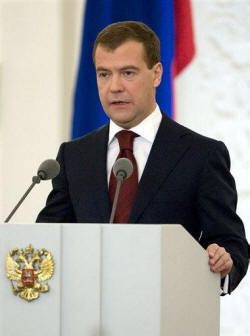 |
Other
News... sponsored by Richardson Repair |


Russia to deploy short-range missiles near Poland
[November 06, 2008]
MOSCOW (AP)
--
In his first state of the nation speech, Medvedev blamed Washington for the war in Georgia and the world financial crisis and suggested it was up to Washington to mend badly damaged ties.
|
Medvedev also proposed increasing the Russian presidential term to six years from four -- a change that could deepen Western concern over democracy in Russia and play into the hands of his mentor, Prime Minister Vladimir Putin, who has not ruled out a return to the Kremlin. Extending the presidential term could mean a possible 12 more years in the top office for the popular Putin. Echoing Putin, who made criticism of Washington and the West a hallmark of his two-term, eight-year presidency, Medvedev used the speech in an ornate Kremlin reception hall to cast Russia as a nation threatened by encroaching American military might. "From what we have seen in recent years -- the creation of a missile defense system, the encirclement of Russia with military bases, the relentless expansion of NATO -- we have gotten the clear impression that they are testing our strength," Medvedev said. He signaled Moscow would not give in to Western calls to pull troops from Georgia's breakaway regions of Abkhazia and South Ossetia, or rescind its recognition of their independence following the August war. "We will not retreat in the Caucasus," he said, winning one of many rounds of applause during the televised 85-minute address. Talking tough, he fleshed out long-promised military measures in response to U.S. plans for missile defense facilities in Poland and the Czech Republic, former Soviet satellites now in NATO. The Kremlin claims the system is meant to weaken Russia, not defend against Iran, as Washington insists. Medvedev said Iskander missiles would be deployed to Russia's western enclave of Kaliningrad, sandwiched between Poland and Lithuania, "to neutralize, if necessary, a missile defense system." The Iskander has a range of about 280 kilometers (175 miles), which would allow it to reach targets in Poland but not in the Czech Republic -- but officials have said its range could be increased. Medvedev did not say whether the missiles would be fitted with nuclear warheads. Russia will also deploy electronic jamming equipment, Medvedev said. After the speech, the Kremlin announced Medvedev had congratulated Obama for winning the U.S. presidency, saying in a telegram he was "counting on a constructive dialogue with you on the basis of trust and taking each other's interests into account." In Washington, State Department spokesman Sean McCormack emphasized that the planned missile defenses were not aimed at Russia. "The steps that the Russian government announced today are disappointing," McCormack said. "But, again, this is not directed at them. Hopefully one day they'll realize that." Medvedev appeared to be trying to improve Russia's bargaining position in potential talks with the Obama administration on missile defense. His wording suggested Russia would reverse the decision if the U.S. scraps its missile defense plans. "Moscow isn't interested in confrontation, and if Obama makes some conciliatory gestures it will respond correspondingly," said Alexander Pikayev, an analyst at Moscow's Institute for World Economy and International Relations. But independent military analyst Alexander Golts said Medvedev's "confrontational tone" could further harm relations with the United States, which plunged to a post-Cold War low over the war in Georgia. "Russia itself is cutting off the route toward better ties," he said. Regional leaders criticized Medvedev's missile warning. German Foreign Minister Frank-Walter Steinmeier said it was "certainly the wrong signal at the wrong time" and urged the U.S. and Russia to see change in the White House as an "opportunity for a new beginning." Medvedev suggested the U.S. must make the first move to break the chill. The Kremlin hopes the incoming administration "will make a choice in favor of full-fledged relations with Russia," he said. In addition to calling for a six-year presidential term, he said parliament's term should be extended to five years instead of four and its power over the executive branch increased. Both changes could strengthen the hand of Putin, who can run for president again in 2012 and now heads the dominant United Russia party. |

